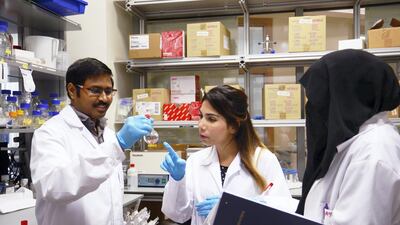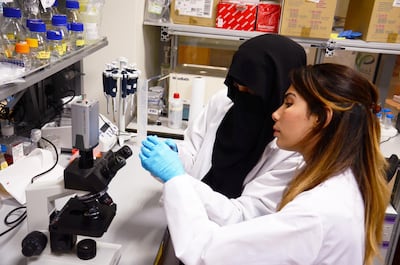UAE scientists have developed a new way of targeting cancerous tumours, paving the way for improved treatment of the disease.
Researchers from New York University Abu Dhabi designed minute nanoparticles capable of delivering existing drugs direct to malignant cells.
The nanoparticles go to work after being injected into a patient’s bloodstream intravenously.
Attached to the surface of each nanoparticle is a small protein-like molecule called a peptide, which ensures the drug is absorbed by the tumour.
So far, the new delivery method has only been tested on mice, but experts in the Emirates have described the results as promising.
“The shrinkage in tumour volume and mass was incredible as was the prolonged survival of the animals,” said Dr Mazin Magzoub, an NYU Abu Dhabi assistant professor.
"A lot of things work beautifully in vitro [or test-tube experiments] but they fall apart in vivo [in a living organism]. These worked beautifully in vivo."
The new research was carried out by six scientists at NYU Abu Dhabi and two from the University of Tennessee in Knoxville.
In initial laboratory testing, tumours in mice saw a significant reduction in size and extended the animals’ lifespan.
The findings were published in the journal Communications Biology earlier this month.
While several years of further development is required before tests on people is possible, the results could prove a catalyst to improved cancer treatment.
One major benefit of the UAE-designed nanoparticles – which are 1,000 times smaller than the diameter of a human hair – is their cost.
Dr Magzoub said they could be manufactured using a low-cost polymer surrounded by a protein shell, allowing them to remain stable in the bloodstream for longer.
The drugs they carry are contained in their core and are also non-toxic, biodegradable, and only attack cancerous cells.
"Most labs have these materials in-house or can get them very cheaply, and in terms of the chemistry it's straightforward," said Dr Magzoub.
The work to develop the new technique was led by Dr Loganathan Palanikumar, a research associate in Dr Magzoub’s laboratory.
The next step is to look at how effective they are at delivering other anti-cancer drugs, possibly including drugs developed by Dr Magzoub’s laboratory.
The same technique may also prove successful in treating Alzheimer's disease.
"We have some novel chemotherapeutics we're developing in the lab," said Dr Magzoub. "The idea is to load them into the nanoparticles.
"If we can deliver these into the tumour we can enhance the efficiency several fold.
"We could also potentially use a system like this to deliver drug therapeutics to the brain. We're looking at the next step - to expand the applicability of the system."
Research on nanoparticles used for drug delivery has been “booming in the past decade”, according to Dr Palanikumar.
“People are trying to increase the efficiency of the treatments and to reduce the side effects.”
It is just the latest breakthrough work to be carried out at the university.
Another research team led by Dr Mazin has devised a method to halt or even reverse the devastating effects of Alzheimer's disease.
The study involved designing small proteins which could be deployed to combat other harmful proteins which prove toxic to the brain.
The scientists are hopeful the research could herald the beginning of clinical trials if successful.



